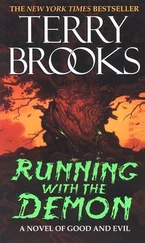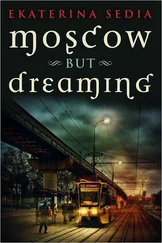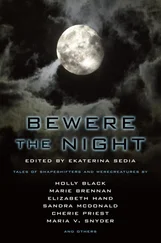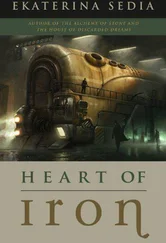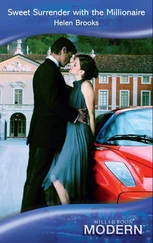And then one of your new friends, over lunch, asks you tactfully if anything’s wrong, if you’re ill, because, well, you don’t look quite yourself. Even as you assure her that you’re fine, you know she means that you look a lot older than you did last year.
At home, you try to discuss this with Jonathan. “We knew it would be a problem eventually,” you tell him. “I’m afraid that other people are going to notice, that someone’s going to figure it out—”
“Stella, sweetheart, no one’s going to figure it out.” He’s annoyed, impatient. “Even if they think you’re aging unusually quickly, they won’t make the leap to Jessie. It’s not in their worldview. It wouldn’t occur to them even if you were aging a hundred years for every one of theirs. They’d just think you had some unfortunate metabolic condition, that’s all.”
Which, in a manner of speaking, you do. You wince. It’s been five weeks since the last sportfuck. “Does it bother you that I look older?” you ask Jonathan.
“Of course not, Stella!” But since he rolls his eyes when he says this, you’re not reassured. You can tell from his voice that he doesn’t want to be having this conversation, that he wants to be somewhere else, maybe watching TV. You recognize that tone. You’ve heard Jonathan’s colleagues use it on their wives, usually while staring at you.
You get through the year. You increase your workout schedule, mine Cosmo for bedroom tricks to pique Jonathan’s flagging interest, consider and reject liposuction for your thighs. You wish you could have a facelift, but the recovery period’s a bit too long, and you’re not sure how it would work with your transitions. You read and read and read, and command an increasingly subtle grasp of the implications of, the interconnections between, different areas of knowledge: ecotourism, Third World famine relief, art history, automobile design. Your lunchtime conversations become richer, your friendships with the faculty wives more genuine.
You know that your growing wisdom is the benefit of aging, the compensation for your wrinkles and for your fading—although fading slowly, as yet—beauty.
You also know that Jonathan didn’t marry you for wisdom.
And now it’s the following year, the year you’re old enough to be Jonathan’s mother, although an unwed teenage one: you’re going on fifty-six while he’s going on forty-one. Your silver hair’s losing its luster, becoming merely gray. Sportfucks coincide, more or less, with major national holidays. Your thighs begin to jiggle when you walk, so you go ahead and have the liposuction, but Jonathan doesn’t seem to notice anything but the outrageous cost of the procedure.
You redecorate the house. You take up painting, with enough success to sell some pieces in a local gallery. You start writing a book about gardening as a cure for ecotourism and agricultural abuses, and you negotiate a contract with a prestigious university press. Jonathan doesn’t pay much attention to any of this. You’re starting to think that Jonathan would only pay attention to a full-fledged Lon Chaney imitation, complete with bloody fangs, but if that was ever in your nature, it certainly isn’t now. Jonathan and Martha Stewart have civilized you.
On four legs, you’re still magnificent, eliciting exclamations of wonder from other pet owners when you meet them in the woods. But Jonathan hardly ever plays ball in the meadow with you anymore; sometimes he doesn’t even take you to the forest. Your walks, once measured in hours and miles, now clock in at minutes and suburban blocks. Sometimes Jonathan doesn’t even walk you. Sometimes he just shoos you out into the backyard to do your business. He never cleans up after you, either. You have to do that yourself, scooping old poop after you’ve returned to two legs.
A few times you yell at Jonathan about this, but he just walks away, even more annoyed than usual. You know you have to do something to remind him that he loves you, or loved you once; you know you have to do something to reinsert yourself into his field of vision. But you can’t imagine what. You’ve already tried everything you can think of.
There are nights when you cry yourself to sleep. Once, Jonathan would have held you; now he rolls over, turning his back to you, and scoots to the farthest edge of the mattress.
During that terrible time, the two of you go to a faculty party. There’s a new professor there, a female professor, the first one the Anthropology Department has hired in ten years. She’s in her twenties, with long black hair and perfect skin, and the men cluster around her the way they used to cluster around you.
Jonathan’s one of them.
Standing with the other wives, pretending to talk about new films, you watch Jonathan’s face. He’s rapt, attentive, totally focused on the lovely young woman, who’s talking about her research into ritual scarification in New Guinea. You see Jonathan’s eyes stray surreptitiously, when he thinks no one will notice, to her breasts, her thighs, her ass.
You know Jonathan wants to fuck her. And you know it’s not her fault, any more than it was ever yours. She can’t help being young and pretty. But you hate her anyway. Over the next few days, you discover that what you hate most, hate even more than Jonathan wanting to fuck this young woman, is what your hate is doing to you: to your dreams, to your insides. The hate’s your problem, you know; it’s not Jonathan’s fault, any more than his lust for the young professor is hers. But you can’t seem to get rid of it, and you can sense it making your wrinkles deeper, shriveling you as if you’re a piece of newspaper thrown into a fire.
You write Diane a long, anguished letter about as much of this as you can safely tell her. Of course, since she hasn’t been around for a few years, she doesn’t know how much older you look, so you simply say that you think Jonathan’s fallen out of love with you since you’re over forty now. You write the letter on paper, and send it through the mail.
Diane writes back, and not a postcard this time: she sends five single-spaced pages. She says that Jonathan’s probably going through a mid-life crisis. She agrees that his treatment of you is, in her words, “barbaric.” “Stella, you’re a beautiful, brilliant, accomplished woman. I’ve never known anyone who’s grown so much, or in such interesting ways, in such a short time. If Jonathan doesn’t appreciate that, then he’s an ass, and maybe it’s time to ask yourself if you’d be happier elsewhere. I hate to recommend divorce, but I also hate to see you suffering so much. The problem, of course, is economic: can you support yourself if you leave? Is Jonathan likely to be reliable with alimony? At least—small comfort, I know—there are no children who need to be considered in all this. I’m assuming that you’ve already tried couples therapy. If you haven’t, you should.”
This letter plunges you into despair. No, Jonathan isn’t likely to be reliable with alimony. Jonathan isn’t likely to agree to couples therapy, either. Some of your lunchtime friends have gone that route, and the only way they ever got their husbands into the therapist’s office was by threatening divorce on the spot. If you tried this, it would be a hollow threat. Your unfortunate metabolic condition won’t allow you to hold any kind of normal job, and your writing and painting income won’t support you, and Jonathan knows all that as well as you do. And your continued safety’s in his hands. If he exposed you—
You shudder. In the old country, the stories ran to peasants with torches. Here, you know, laboratories and scalpels would be more likely. Neither option’s attractive.
You go to the art museum, because the bright, high, echoing rooms have always made it easier for you to think. You wander among abstract sculpture and impressionist paintings, among still-lifes and landscapes, among portraits. One of the portraits is of an old woman. She has white hair and many wrinkles; her shoulders stoop as she pours a cup of tea. The flowers on the china are the same pale, luminous blue as her eyes, which are, you realize, the same blue as your own.
Читать дальше

